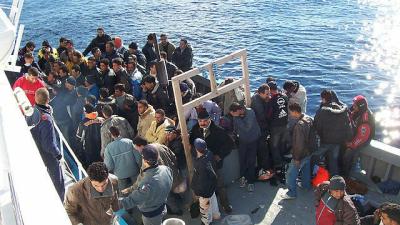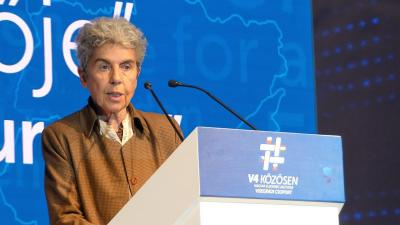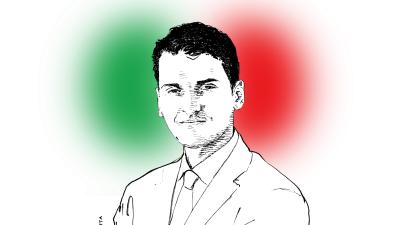A flow of immigrants never seen before. Every day, hundreds and hundreds of arrivals on Italian coasts are bringing reception workers to their knees. Lampedusa, the Italian territory closest to North Africa, has been under siege for weeks. The centre of this small and lovely island is invaded by - for the most part - burly young Africans, who arrived in Europe through the Italian gates, and who usually soon ask to leave, heading for Germany, France and the rest of Northern Europe.
That this is not solely an Italian problem is, we would say, clear to all. It is equally understandable that countries suffering from secondary immigration, i.e. those coping with arrival rather than transit of migrants like our country, are at the front line to stop redistribution of immigrants. It is more than understandable that countries like Hungary and Poland do not accept the redistribution of immigrants happily ever after. They see what Italian streets have become like, and rightly want to prevent integration from failing as it has failed here. And integration fails when the number of arrivals is too high compared to the capacity of the European countries that receive these people. Actually, it is not only the Visegrad countries that are putting the brakes on redistribution of immigrants, but also France itself. It has deployed its anti-terrorist forces at Ventimiglia on the French-Italian border to stop the passage of immigrants - who are there often beaten and clubbed by the French forces. Also the much more progressive and liberal Germany, which has placed controls at the Czech Republic border (so much for the Schengen Treaty), does not want to help Italy face one of the main challenges Europe has to fight.
The number of migrants arriving in Italy this year is unprecedented: we are talking about over one hundred thousand arrivals! It is the website of the Ministry of the Interior that shows us this data. Better not to make comparisons with the past... the situation has worsened radically. Already in August the number of arrivals was twice as high as during the whole 2022. The largest number of migrants came from Guinea, followed by the Ivory Coast, then Egypt and Tunisia. The latter represents one of the main lands from which barges leave for our shores. It is no coincidence that our Prime Minister, Giorgia Meloni, is working precisely on Tunisia, in concert with European institutions, so that the country led by Kais Saied can support Italy in stemming immigration.
Von der Leyen, together with Meloni and Dutch Prime Minister Rutte, went directly to Tunis to sign a strategic partnership, which includes several areas, including clearly also immigration. There are five main points in the agreement. First, the European Union pledges to support Tunisia, which is in danger of default, economically and financially. Then, among the objectives is also the strengthening of trade and economic relations between Tunis and the European countries. This cooperation, however, is also necessarily channelled through the support provided by Europe to the Tunisian professional and educational world – with the aim of training people who can thus remain in Tunisia and contribute to their country's development. Finally, the last two areas, perhaps the most important ones, of this newborn partnership, concern the energy sector and illegal immigration.
We should all applaud both the European Union, which has finally made a unified move in foreign policy, and Italy for having opened important and concrete diplomatic channels with Tunis, leading it down the path of dialogue. But, as always, there was no shortage of critics of this agreement. Even from within the European Union came several criticisms. For example, Josep Borrell, the EU's High Representative for Foreign Policy and Vice-President of the Commission, fiercely criticised Von der Leyen's choice to enter into such an agreement, accusing it of being the result of an exclusively unilateral effort by the Commission, without going through the Council. But criticism of the Commission President also came from Italy. Two members of the Democratic Party, and supporters of indiscriminate reception of immigrants, Giuseppe Provenziano and the former President of the Chamber of Deputies Laura Boldrini, followed up the criticism by the European Group of Socialists and Democrats, arguing that Tunisia is not a safe country for migrants nor for its own citizens. In a nutshell, therefore, Tunisians still living there are being told to flee as soon as possible, while arguing that a country that is to become an ally is better off not to become one.
The Italian left, in line with the overall European left, does not know what position to take on immigration. Taking in poor desperate people is understandable. But it is not understandable to accept - or even support - a systematic violation of the laws - as shown by the clandestine behaviour of immigrants - and the decline of Europe.
Read also
Chantal Delsol: France is a country of riots. And for specific reasons.
Every uprising has its own motives, linked to the events of the day.
Francesco Giubilei
Interview with Marie d’Armagnac
The protests that have shaken France in recent days have their roots in decades of flawed social and cultural policies that need to be investigated in order to understand how such a potentially explosive situation came about.
Francesco Giubilei
The centre-right wins in Lazio and Lombardy and strengthens the government
On 12-13 February 2023, votes were cast in Lombardy and Lazio, two of the main Italian regions where the cities of Milan and Rome are located. Lombardy is one of Europe's most important economic regions with 10 million inhabitants and a gross domestic product higher than many European states.















Comments (0)